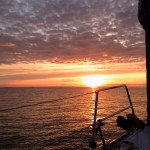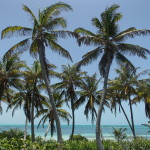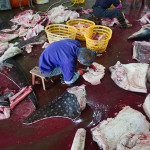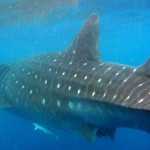Sorry I’ve been a bit quiet lately, but I’ve got a reason, honest. It’s not even an excuse. See, I’ve been a bit wrapped up with this; for which I am serving as the chair of the organising committee. The 3rd International Whale Shark Conference starts next week and is being hosted at Georgia Aquarium in downtown Atlanta. We will have delegates representing over 20 countries, and not your run-of-the-mill “UK, France, Germany, USA” type countries either, but really interesting countries like Mozambique, Philippines, Indonesia, Seychelles, Maldives, Qatar, Honduras and even St Helena. Personally, I can’t wait to meet the rest of the world’s whale shark research community. We’re a small bunch, less than 100 world wide, and pretty thinly dispersed across the intertropical zone, so opportunities like this are rare. It’s been 5 years since the last one and so much has happened in that time, as regular readers will know (like this and this and this and this and this and this and this )
In conjunction with the conference, National Geographic photographer Brian Skerry will be speaking at the aquarium on the evening of Tuesday October 8th, with proceeds going to support whale shark research. If you’re interested and around Atlanta at the time, Info and tickets are available here
One really important aspect of the conference will be an IUCN Red List Workshop, at which the global whale shark science community will debate the conservation status of this species. Right now it is listed as “Vulnerable” and the scientists will be discussing whether there is sufficient cause to ease back to “Threatened”, or whether the data suggest we should remain vulnerable or advance to “Endangered”.
It’s unusual but not unique to devote an international conference to a single species (I once went to a mouth-watering Symposium all about lobsters). They’re interesting meetings because they cut across all sorts of scientific disciplines like anatomy, natural history, biochemistry, genetics, and conservation, which provides a unique sort of wholistic perspective. Some papers arising from the conference will be published in PeerJ, so we’re doing our bit for #OpenAccess too.
If you’re interested in following the conference, you can like it on Facebook, or follow Tweets with the hashtag #IWSC3, although to be blunt, whale shark scientists aren’t well represented on twitter, so you may as well just follow me and Simon Pierce :)
I’ll endeavour to send update during or after the conference, but in the meantime, here’s the whale shark emoticon for you all:
:( )






It’s going to be a brilliant week. Your hard work is appreciated! :( )
Hi, love your post on Whale Sharks. I am really passionate about these fish/mammals as you can see. I don’t even what they are. Thanks for the write up. I am referencing it in my Hindi presentation to 3 people. Love Adam Newman, USA (one of the boring countries)
Hello there! Great article, para_sight! I’m studying in college now and take much interest in whales. These mammals are really wonderful. I dream about having a chance to listen to their singing, but now I can only listen to some recordings http://mp3brains.com/search.html?q=whale+sounds
Whale sharks are sharks, not whales, and they don’t sing (that we know of)
Hi
I’m from St. Helena Island. Last year and this year we’ve had a strange influx of Whale Sharks around the island. Last year was 17 individuals and this year over 35. Why is this?? Oh by the way, I went swimming with them and they are beautiful.